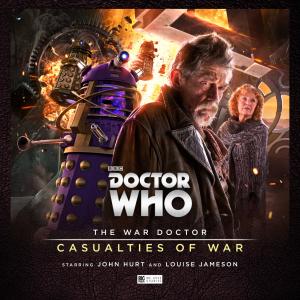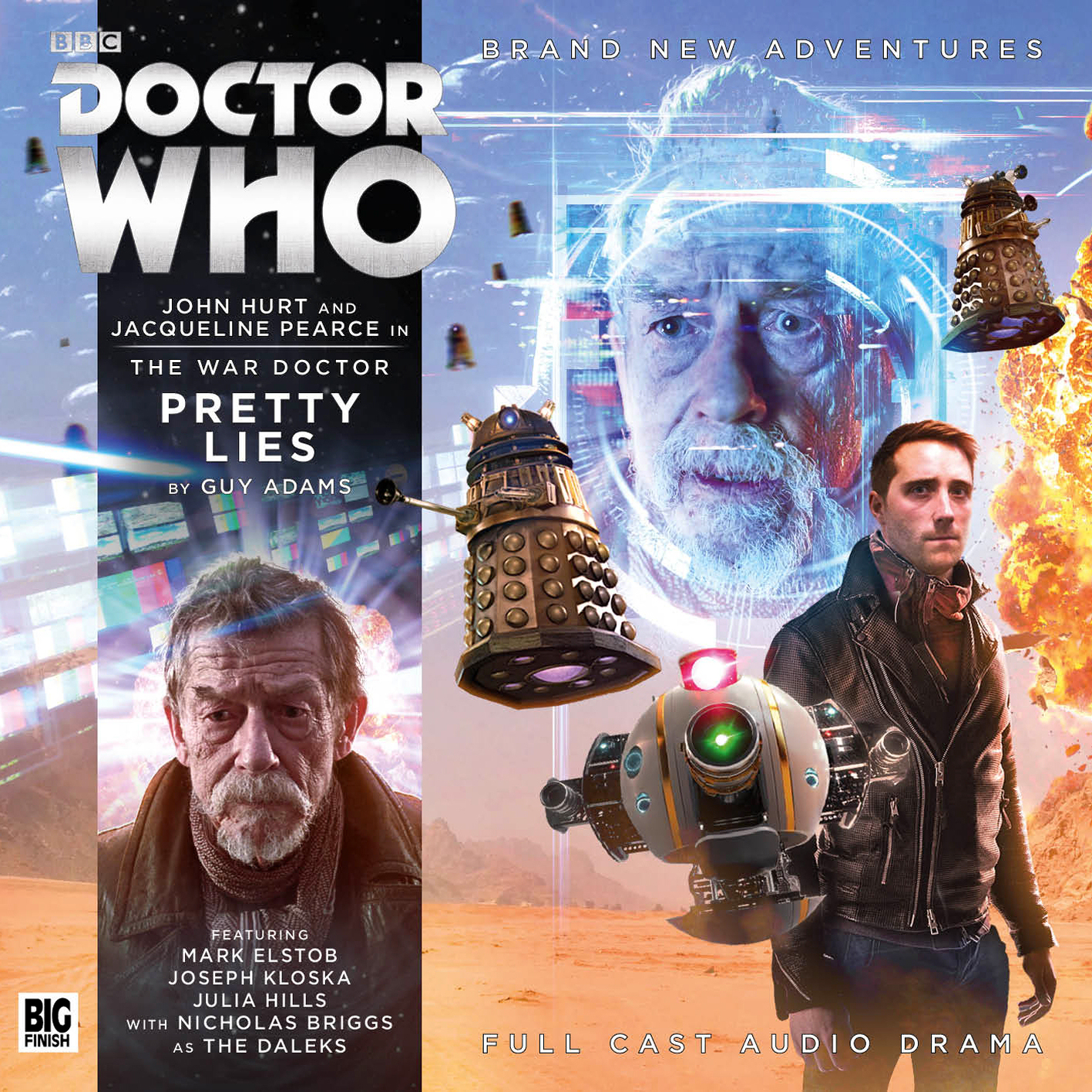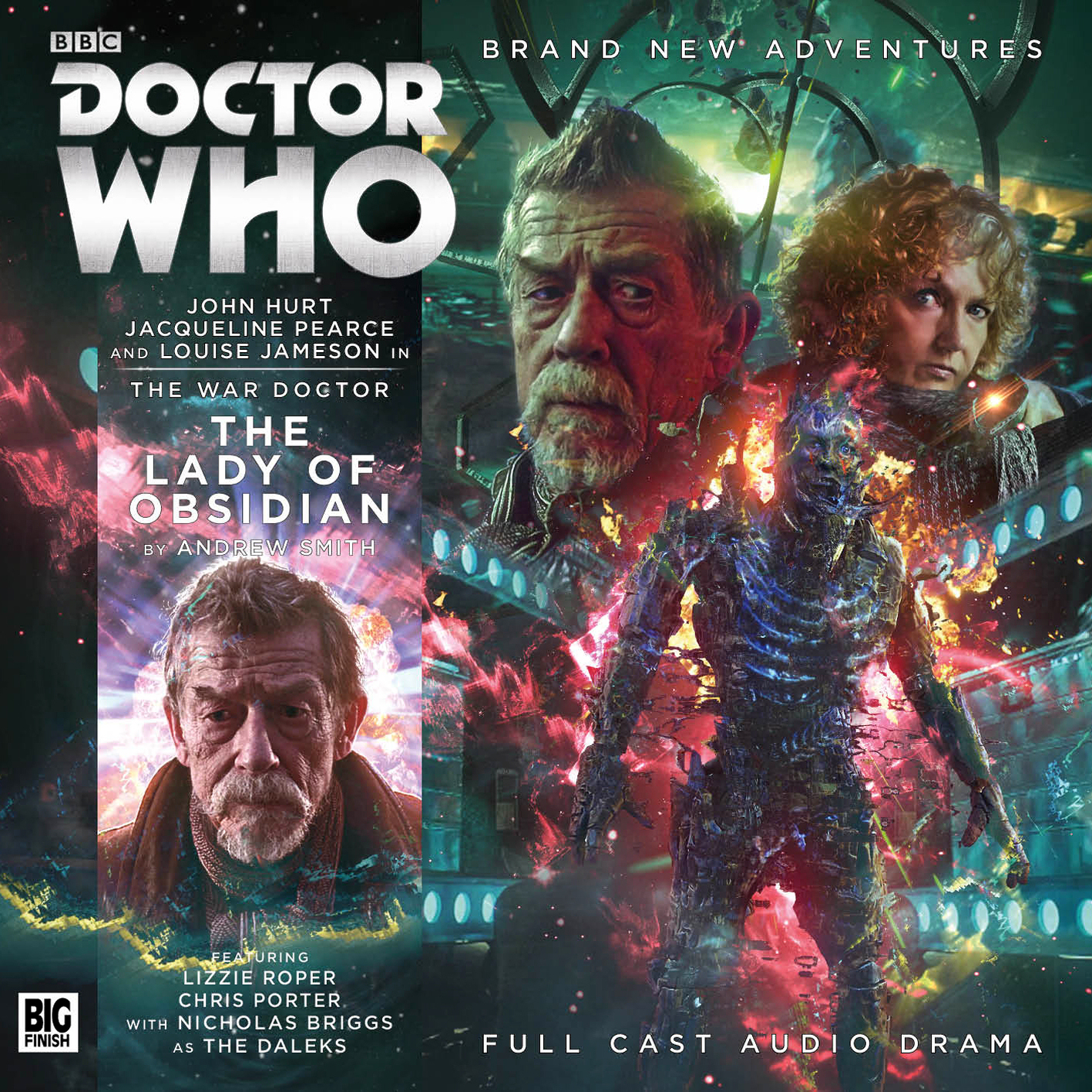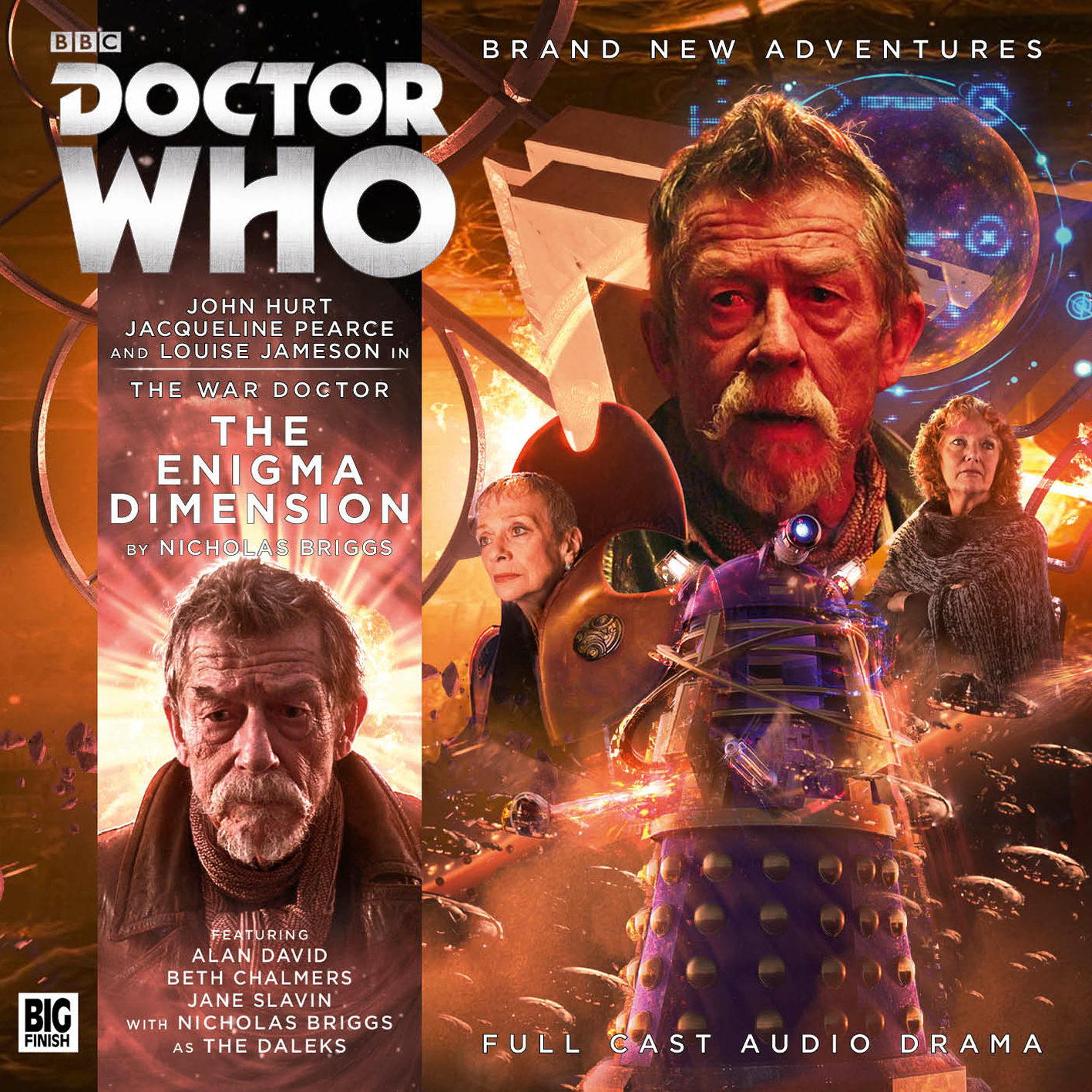
Written by Guy Adams, Andrew Smith and Nicholas Briggs
Produced by David Richardson
Directed by Nicholas Briggs
Big Finish Productions, 2017
Stars: John Hurt (The War Doctor), Louise Jameson (Leela), Jacqueline Pearce (Cardinal Ollistra), Joseph Kloska (Schandel), Julia Hills (Sera/Spokesperson), Mark Elstob (Editor/Old Man), Lizzie Roper (Rosata Laxter/High Minister), Chris Porter (Skaul/Freel), Alan David (Castellan Kanteer), Jane Slavin (Panopticon Guard Lintok), and Nicholas Briggs (Dalek Time Strategist/Daleks/Assault Team Leader)
“I’m the stuff of nightmares! I’m a murderer, a warrior, a demon let loose in the time stream, a man who’s lost his conscience, his friends – even his name!”
The War Doctor
The latest – and possibly last – instalment in Big Finish’s The War Doctor saga, Casualties of War, has an unintentional poignant edge to it – it is the last Doctor Who-related work of the late, great Sir John Hurt. Hurt delivers such a lively, commanding, sometimes weary and at other times profound portrayal that it is hard to believe the owner of that distinctive, gravelly voice will no longer entertain us with his gift. As co-star Louise Jameson remarks in the CD extras, his voice is “perfect for audio … so full of character and a life lived!”
Hurt clearly enjoyed doing drama on audio; he could project his wonderful voice and deliver some great oratory. Indeed, in an interview with BF supremo Nick Briggs (that is available as part of a tribute podcast that BF released not long after his death), Hurt talked about the advantages of radio drama over television and the theatre.
“I love sound for a start,” he told Briggs. “I’ve always enjoyed voice work, I’ve always enjoyed doing radio, I think, because it’s very akin to film and less akin to stage … You can cut between this time, that time … You can play with it the same way you can in film but it’s more immediate. You have to have a sensibility for it, you have to hear it in your head, you have to know what your voice is sounding like and how it comes across.” There is no doubt that Hurt was in his element in The War Doctor saga and in BF’s adaptation of HG Wells’ The Invisible Man.
Despite Hurt’s dedication to his art, Casualties of War won’t ever be a tour de force, nor is it the best of BF’s four War Doctor volumes. However, it would be unfair to judge it too harshly in the context of Hurt’s passing. It is an entertaining collection, and it brings The War Doctor saga to a satisfactory, if somewhat predictable close.
Just as the titles of the last couple of box sets reflected loose themes – eg the lengths to which Daleks and Time Lords alike would go to find an edge in Infernal Devices, and the machinations of third parties in Agents of Chaos – so Casualties of War explores the impact of the Time War on worlds, societies and even other realities unlucky enough to be caught in the crossfire. The war’s effects through time have been explored in other Doctor Who audios (notably the Eighth Doctor serial The Sontaran Ordeal) but this box set does a sterling job of putting the Time Lords, the Daleks and the listeners on the front line.
 Pretty Lies, the first of Volume 4’s tales, largely resumes from where Vol 3 concluded, with the Doctor and Time Lord War Council strategist Cardinal Ollistra (Jacqueline Pearce) on the run from the Daleks. In some respects, the story setting is reminiscent of an old Western – as a couple of strangers “mosey” into an isolated township on a remote frontier planet and inadvertently defend it against marauders.
Pretty Lies, the first of Volume 4’s tales, largely resumes from where Vol 3 concluded, with the Doctor and Time Lord War Council strategist Cardinal Ollistra (Jacqueline Pearce) on the run from the Daleks. In some respects, the story setting is reminiscent of an old Western – as a couple of strangers “mosey” into an isolated township on a remote frontier planet and inadvertently defend it against marauders.
After crash landing on Beltox, the Doctor and Ollistra meet Schandel (Joseph Kloska), a time-travelling war correspondent. Schandel, with the aid of an AI conveniently called Editor (Mark Elstob), has anticipated their arrival and is aware of their roles in an impending Dalek attack on the human township of Fairgill. Reluctantly the Doctor and Ollistra must use their wits and Fairgill’s scant resources to buy themselves time and save as many lives as possible against an all-out Dalek assault.
Throughout almost two decades of BF’s Doctor Who range, we’ve come across a few journalists and war correspondents in its serials (notably in Colditz and The Angel of Scutari). Whereas those characters were largely unlikeable and unheroic, Schandel is clearly naïve. In fact, given his unbridled enthusiasm upon meeting one of his idols – “the legendary Doctor”, “the greatest hero of the Time War” and an “inspiration” – it’s clear Schandel is more of a clueless, overexcited fanboy than a detached journalist. “I’m not normally this giddy!” he confesses to the Doctor. “I really am a bit of a fan!”
There is no doubt that scribe Guy Adams has based Schandel on a variety of Doctor Who fans he’s met but he doesn’t let the character get too out of control. Adams uses Schandel to show, much to the Doctor’s chagrin, how truth can indeed be one of the first casualties of war and how the camera can sanitise war for the sake of entertainment. Indeed, the Doctor is horrified when his words are edited and presented in a context that make him out to be a hero (the one thing he insists he’s not).
Adams devises a clever ruse at the climax which also ties in with his underlying commentary on the wartime role of the media. It’s not necessarily an original climax (indeed it’s very reminiscent of a ruse used to fool Pearce’s former persona Servalan in the Blake’s 7 TV episode The Harvest of Kairos) but it’s effective and dramatic.
 The second instalment, The Lady of Obsidian, sees the War Doctor and Cardinal Ollistra again on the front lines of the Time War, as the Time Lords make a stand at the planet Grend. While Ollistra seeks to amass a Gallifreyan time fleet to head off an impending Dalek strike force, the Doctor goes in search of the mysterious “Lady of Obsidian” to recruit her guerrilla faction which is attacking Dalek forces in the sector. It isn’t long before the Doctor realises the so-called “Lady” is in fact his former companion Leela (Louise Jameson). But this is a very changed Leela from the “savage” we knew in the classic era of Doctor Who and indeed in BF’s Gallifrey spin-off series. Her psyche has been scarred – both figuratively and literally – by the Time War. While Leela’s affliction – a “time wound” – is not entirely convincing to the listener (anyone else in her position would probably be driven mad by the condition), Louise Jameson turns in a persuasively tortured, anguished, confused and uncertain portrayal. In the subsequent tale, once restored of her faculties, Jameson portrays the naïve, instinctive and curious huntress that we’ve loved for more than 40 years.
The second instalment, The Lady of Obsidian, sees the War Doctor and Cardinal Ollistra again on the front lines of the Time War, as the Time Lords make a stand at the planet Grend. While Ollistra seeks to amass a Gallifreyan time fleet to head off an impending Dalek strike force, the Doctor goes in search of the mysterious “Lady of Obsidian” to recruit her guerrilla faction which is attacking Dalek forces in the sector. It isn’t long before the Doctor realises the so-called “Lady” is in fact his former companion Leela (Louise Jameson). But this is a very changed Leela from the “savage” we knew in the classic era of Doctor Who and indeed in BF’s Gallifrey spin-off series. Her psyche has been scarred – both figuratively and literally – by the Time War. While Leela’s affliction – a “time wound” – is not entirely convincing to the listener (anyone else in her position would probably be driven mad by the condition), Louise Jameson turns in a persuasively tortured, anguished, confused and uncertain portrayal. In the subsequent tale, once restored of her faculties, Jameson portrays the naïve, instinctive and curious huntress that we’ve loved for more than 40 years.
In the 2009-10 two-parter The End of Time, the Tenth Doctor spoke of other factions joining the Time War, including the “Could’ve Been King and his army of Meanwhiles and Neverweres”. Lady of Obsidian writer Andrew Smith delivers a variation on this one-off line, creating the Unlived, hostile beings from a rift in the space/time continuum. While the Unlived, led by the Gollum-like Skaul (Chris Porter), are described by Leela as an even greater threat than the Daleks, they are for the most part unconvincing and one-dimensional. It could be argued the Unlived are meant to be vague beings but that shouldn’t make them caricatures as well.
Just as Pretty Lies borrows ideas from the Western trope, so The Lady of Obsidian draws heavily from space opera influences, notably Star Wars and Star Trek. This is evident in the dogfights in space between Dalek saucers and Battle TARDISes, the Doctor’s recruitment of a cocky former soldier-turned-smuggler, a guerrilla group that hides deep in a nebula (not unlike the Maquis in the Trek spin-off Deep Space Nine) and an “evil galactic empire” (the Daleks) intent on crushing all “non-Dalek life”.
 The final instalment – The Enigma Dimension – is also reminiscent of a Star Trek episode (particularly DS9’s opening episode Emissary). Like The Lady of Obsidian, Nicholas Briggs’ script foreshadows significant concepts in the modern Doctor Who TV series, principally the Dalek containment sphere (or void ship) which graced Torchwood One’s Canary Wharf HQ in Army of Ghosts/Doomsday. The Doctor, with the TARDIS back in his possession and Leela once more at his side, returns to Gallifrey, to be confronted with a potential threat: the extra-dimensional, non-linear Enigma, a life form unlike any he has encountered before. It is no coincidence that the Enigma arrives as reality on Gallifrey starts to shift; there are reports of “phantom Daleks” appearing in the Time Lord Capitol, portending an imminent invasion. Needless to say, the Daleks’ “prime objective” to win the Time War is more ambitious than mere conquest …
The final instalment – The Enigma Dimension – is also reminiscent of a Star Trek episode (particularly DS9’s opening episode Emissary). Like The Lady of Obsidian, Nicholas Briggs’ script foreshadows significant concepts in the modern Doctor Who TV series, principally the Dalek containment sphere (or void ship) which graced Torchwood One’s Canary Wharf HQ in Army of Ghosts/Doomsday. The Doctor, with the TARDIS back in his possession and Leela once more at his side, returns to Gallifrey, to be confronted with a potential threat: the extra-dimensional, non-linear Enigma, a life form unlike any he has encountered before. It is no coincidence that the Enigma arrives as reality on Gallifrey starts to shift; there are reports of “phantom Daleks” appearing in the Time Lord Capitol, portending an imminent invasion. Needless to say, the Daleks’ “prime objective” to win the Time War is more ambitious than mere conquest …
Briggs – who again voices the Daleks, including their deep-throated Time Strategist – quite rightfully resists the temptation to end The War Doctor saga on a space opera tour de force. Instead, he delivers a script that is quite surreal, ethereal and (excuse the pun) enigmatic – but definitely not to the extent that the listener loses track of the story. Indeed, some of John Hurt’s best work inevitably comes to the fore in The Enigma Dimension, particularly in the climactic confrontation with the Time Strategist.
Hurt’s performance is no doubt bolstered by close friend Jacqueline Pearce as Ollistra. As a reluctant sidekick or “helper” (her word for the Doctor’s erstwhile companions over many centuries), the cardinal is the perfect foil for the jaded, cranky War Doctor. No doubt due to her recent travels with the Doctor in Volumes 3 and 4, the character’s disposition has softened since she was first introduced in Only the Monstrous. She even shows signs of altruism. Ollistra passes off defending Grend as being a strategic advantage for Gallifrey that “by a pleasant coincidence … also happens to be the right thing to do”. However, she is also clearly shaken and emboldened enough by Beltox’s fate at the end of the Fairgill engagement to ensure that the Daleks do not repeat their atrocities in the Grend system. Ollistra’s ruthless, calculating streak really comes to the fore in the climax to The Enigma Dimension when, to the Doctor’s disgust, she seizes an opportunity to ultimately turn the Time War in the Time Lords’ favour.
Again, Pearce’s performance cannot help but be compared to her Blake’s 7 alter ego Servalan; regardless she is an outstanding actor. And while this volume has debunked my theory (first postulated in my review of Vol 2) that “the unhappy woman” (as Leela cheekily calls Ollistra) is not a Time War incarnation of former companion Romana, it is great that Pearce’s Ollistra will continue to be a foil in the forthcoming The Eighth Doctor – The Time War series.
Aside from Hurt, Pearce and Jameson’s outstanding performances, Volume 4 of The War Doctor saga again provides great performances from some of Big Finish’s lesser known artistes – in particular, Julia Hills as Fairgill’s governor Sera and Lizzy Roper as smuggler Rosata Laxter – as well as excellent sound effects and incidental music from Howard Carter. In The Enigma Dimension, Carter’s blending of the iconic Dalek throbbing sound effect (which dates back to the pepperpots’ very first TV appearance in 1963-4) with the incidental track is particularly inspired and foreboding. It’s a masterstroke that Murray Gold has not even attempted in the modern TV series.
While not as memorable as the first three volumes in The War Doctor saga, Casualties of War is nevertheless entertaining and there are plenty of striking moments and performances – not least from Hurt himself. His confrontation with the Time Strategist in the climactic moments of The Enigma Dimension is both humorous and sublime. One moment, the War Doctor is describing the Daleks’ extra-dimensional destructor beam as “startlingly imaginative … Does what it says on the tin, I expect. Hardly surprising from a race of tin cans!” The next he is waxing lyrical about what fear means to him and the Daleks:
Perhaps I do fear ... Perhaps I do but not you yourselves. I fear what you can do. Yes, I fear that – the death, the pain, the suffering, the merciless, senseless destruction of … well, everything that isn’t you! Yes, I do fear that. But as for you, the Daleks fear powerlessness, defeat and in everything and everyone you ever encounter, you see your fear staring right back at you!
Whilst Hurt’s dialogue is extremely well written by Briggs, it succeeds because of Hurt’s wonderful delivery. Some of his final words as the War Doctor are equally as memorable:
We Time Lords have fought too long and too hard to be anything other than warriors … If the Daleks alone were to be destroyed, I think we would find someone else to fight now! I think that’s my real fear – that the war will never end!
Sadly, with Hurt’s passing, such wonderful monologues and dialogue is gone forever. It can only be hoped the great man’s departure doesn’t entirely close the door on the War Doctor’s adventures. BF has announced that the next four volumes of the Eighth Doctor’s adventures will focus on the beginnings of the Time War, which should compensate for the vacuum The War Doctor series leaves. However, why couldn’t there be more volumes of The War Doctor in the long-term? Yes, John Hurt won’t be there, but the absences of the actors to play the first three Doctors and Christopher Eccleston’s self-imposed exile from all things Who have not stopped BF delivering further adventures for each of those incarnations. Hurt’s Doctor shouldn’t be an exception, particularly as Ollistra, Leela and Veklin (Beth Chalmers, who appeared in Vol 1 and also makes a cameo in Vol 4) could all play parts in future narratives.
Hurt’s passing need not entirely mark the end of what has been a great series – and what better tribute could there be than to continue the adventures of a character whose artiste was so beloved by generations of viewers and who will even be long remembered by some Doctor Who fans as the noblest Doctor of them all?

 Pretty Lies, the first of Volume 4’s tales, largely resumes from where Vol 3 concluded, with the Doctor and Time Lord War Council strategist Cardinal Ollistra (Jacqueline Pearce) on the run from the Daleks. In some respects, the story setting is reminiscent of an old Western – as a couple of strangers “mosey” into an isolated township on a remote frontier planet and inadvertently defend it against marauders.
Pretty Lies, the first of Volume 4’s tales, largely resumes from where Vol 3 concluded, with the Doctor and Time Lord War Council strategist Cardinal Ollistra (Jacqueline Pearce) on the run from the Daleks. In some respects, the story setting is reminiscent of an old Western – as a couple of strangers “mosey” into an isolated township on a remote frontier planet and inadvertently defend it against marauders. The second instalment, The Lady of Obsidian, sees the War Doctor and Cardinal Ollistra again on the front lines of the Time War, as the Time Lords make a stand at the planet Grend. While Ollistra seeks to amass a Gallifreyan time fleet to head off an impending Dalek strike force, the Doctor goes in search of the mysterious “Lady of Obsidian” to recruit her guerrilla faction which is attacking Dalek forces in the sector. It isn’t long before the Doctor realises the so-called “Lady” is in fact his former companion Leela (Louise Jameson). But this is a very changed Leela from the “savage” we knew in the classic era of Doctor Who and indeed in BF’s Gallifrey spin-off series. Her psyche has been scarred – both figuratively and literally – by the Time War. While Leela’s affliction – a “time wound” – is not entirely convincing to the listener (anyone else in her position would probably be driven mad by the condition), Louise Jameson turns in a persuasively tortured, anguished, confused and uncertain portrayal. In the subsequent tale, once restored of her faculties, Jameson portrays the naïve, instinctive and curious huntress that we’ve loved for more than 40 years.
The second instalment, The Lady of Obsidian, sees the War Doctor and Cardinal Ollistra again on the front lines of the Time War, as the Time Lords make a stand at the planet Grend. While Ollistra seeks to amass a Gallifreyan time fleet to head off an impending Dalek strike force, the Doctor goes in search of the mysterious “Lady of Obsidian” to recruit her guerrilla faction which is attacking Dalek forces in the sector. It isn’t long before the Doctor realises the so-called “Lady” is in fact his former companion Leela (Louise Jameson). But this is a very changed Leela from the “savage” we knew in the classic era of Doctor Who and indeed in BF’s Gallifrey spin-off series. Her psyche has been scarred – both figuratively and literally – by the Time War. While Leela’s affliction – a “time wound” – is not entirely convincing to the listener (anyone else in her position would probably be driven mad by the condition), Louise Jameson turns in a persuasively tortured, anguished, confused and uncertain portrayal. In the subsequent tale, once restored of her faculties, Jameson portrays the naïve, instinctive and curious huntress that we’ve loved for more than 40 years. The final instalment – The Enigma Dimension – is also reminiscent of a Star Trek episode (particularly DS9’s opening episode Emissary). Like The Lady of Obsidian, Nicholas Briggs’ script foreshadows significant concepts in the modern Doctor Who TV series, principally the Dalek containment sphere (or void ship) which graced Torchwood One’s Canary Wharf HQ in Army of Ghosts/Doomsday. The Doctor, with the TARDIS back in his possession and Leela once more at his side, returns to Gallifrey, to be confronted with a potential threat: the extra-dimensional, non-linear Enigma, a life form unlike any he has encountered before. It is no coincidence that the Enigma arrives as reality on Gallifrey starts to shift; there are reports of “phantom Daleks” appearing in the Time Lord Capitol, portending an imminent invasion. Needless to say, the Daleks’ “prime objective” to win the Time War is more ambitious than mere conquest …
The final instalment – The Enigma Dimension – is also reminiscent of a Star Trek episode (particularly DS9’s opening episode Emissary). Like The Lady of Obsidian, Nicholas Briggs’ script foreshadows significant concepts in the modern Doctor Who TV series, principally the Dalek containment sphere (or void ship) which graced Torchwood One’s Canary Wharf HQ in Army of Ghosts/Doomsday. The Doctor, with the TARDIS back in his possession and Leela once more at his side, returns to Gallifrey, to be confronted with a potential threat: the extra-dimensional, non-linear Enigma, a life form unlike any he has encountered before. It is no coincidence that the Enigma arrives as reality on Gallifrey starts to shift; there are reports of “phantom Daleks” appearing in the Time Lord Capitol, portending an imminent invasion. Needless to say, the Daleks’ “prime objective” to win the Time War is more ambitious than mere conquest …









